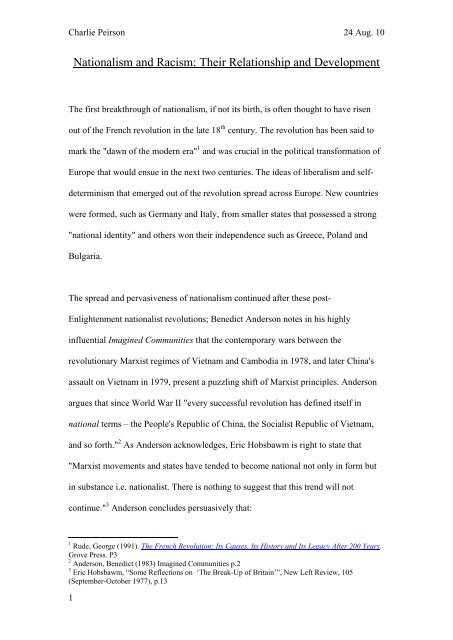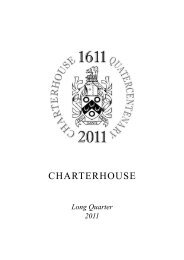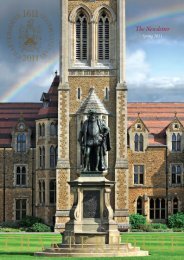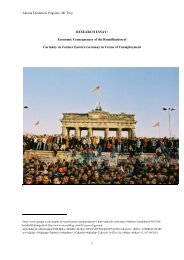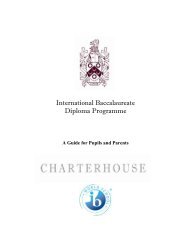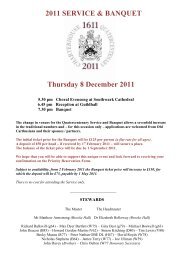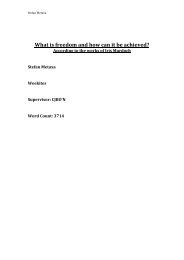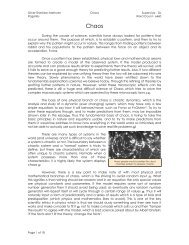Nationalism and Racism: Their Relationship and ... - Charterhouse
Nationalism and Racism: Their Relationship and ... - Charterhouse
Nationalism and Racism: Their Relationship and ... - Charterhouse
You also want an ePaper? Increase the reach of your titles
YUMPU automatically turns print PDFs into web optimized ePapers that Google loves.
Charlie Peirson 24 Aug. 10<br />
<strong>Nationalism</strong> <strong>and</strong> <strong>Racism</strong>: <strong>Their</strong> <strong>Relationship</strong> <strong>and</strong> Development<br />
The first breakthrough of nationalism, if not its birth, is often thought to have risen<br />
out of the French revolution in the late 18 th century. The revolution has been said to<br />
mark the "dawn of the modern era" 1 <strong>and</strong> was crucial in the political transformation of<br />
Europe that would ensue in the next two centuries. The ideas of liberalism <strong>and</strong> selfdeterminism<br />
that emerged out of the revolution spread across Europe. New countries<br />
were formed, such as Germany <strong>and</strong> Italy, from smaller states that possessed a strong<br />
"national identity" <strong>and</strong> others won their independence such as Greece, Pol<strong>and</strong> <strong>and</strong><br />
Bulgaria.<br />
The spread <strong>and</strong> pervasiveness of nationalism continued after these post-<br />
Enlightenment nationalist revolutions; Benedict Anderson notes in his highly<br />
influential Imagined Communities that the contemporary wars between the<br />
revolutionary Marxist regimes of Vietnam <strong>and</strong> Cambodia in 1978, <strong>and</strong> later China's<br />
assault on Vietnam in 1979, present a puzzling shift of Marxist principles. Anderson<br />
argues that since World War II "every successful revolution has defined itself in<br />
national terms – the People's Republic of China, the Socialist Republic of Vietnam,<br />
<strong>and</strong> so forth." 2 As Anderson acknowledges, Eric Hobsbawm is right to state that<br />
"Marxist movements <strong>and</strong> states have tended to become national not only in form but<br />
in substance i.e. nationalist. There is nothing to suggest that this trend will not<br />
continue." 3 Anderson concludes persuasively that:<br />
1 Rude, George (1991). The French Revolution: Its Causes, Its History <strong>and</strong> Its Legacy After 200 Years.<br />
Grove Press. P3<br />
2 Anderson, Benedict (1983) Imagined Communities p.2<br />
3 Eric Hobsbawm, “Some Reflections on „The Break-Up of Britain‟”, New Left Review, 105<br />
(September-October 1977), p.13<br />
1
Charlie Peirson 24 Aug. 10<br />
the 'end of the era of nationalism,' so long prophesised, is not remotely in sight. Indeed,<br />
nation-ness is the most universally legitmate value in the political life of our time. 4<br />
It is thus evident that nations <strong>and</strong> nation-states are integrally bound with the<br />
development of capitalism <strong>and</strong> industrialisation; however, as clear as this<br />
development <strong>and</strong> permeation appears, its explanation still remains "a matter of long<br />
st<strong>and</strong>ing dispute." 5 Theories <strong>and</strong> interpretations of nationalism have produced a large<br />
volume of literature <strong>and</strong> academic interest in the last half of the 20 th century. In Ernest<br />
Gellner's famous book on nationalism, Nations <strong>and</strong> <strong>Nationalism</strong>, he describes it as:<br />
…primarily a political principle that holds that the political <strong>and</strong> the national unit should be<br />
congruent.<br />
<strong>Nationalism</strong> as a sentiment, or as a movement, can best be defined in terms of this<br />
principle. Nationalist sentiment is the feeling of anger aroused by the violation of the<br />
principle, or the feeling of satisfaction aroused by its fulfilment. A nationalist movement is one<br />
actuated by sentiment of this kind 6<br />
In this theory the term nationalism refers to a link between ethnicity <strong>and</strong> the state <strong>and</strong><br />
therefore, the term nation-state is a state dominated by that specific ethnicity, whose<br />
signs of identity, such as language <strong>and</strong> religion, are often embedded in its symbolism<br />
<strong>and</strong> legislation.<br />
In Benedict Anderson's Imagined Communities he argues for a more anthropological<br />
definition of nationalism because as he notes "part of the difficulty is that one tends<br />
4 Anderson, Benedict (1983) Imagined Communities p.3<br />
5 Ibid., p.3<br />
6 Gellner, <strong>Nationalism</strong>, 1983, p. 1<br />
2
Charlie Peirson 24 Aug. 10<br />
unconsciously to hypostasize the existence of <strong>Nationalism</strong>-with-a-big-N…<strong>and</strong> then to<br />
classify 'it' as an ideology." 7 He believes it should be defined along with concepts<br />
such as 'kinship' <strong>and</strong> 'religion' rather than other ideologies. Anderson defines a nation<br />
as "an imagined political community – <strong>and</strong> imagined as both inherently limited <strong>and</strong><br />
sovereign." 8 It is imagined because the members of "even the smallest nation will<br />
never know most of their fellow-members" 9 yet they all share a sense of belonging to<br />
an imagined community. It is imagined as limited because no matter how large the<br />
nation, it is always finite <strong>and</strong> beyond it lie other nations; as Anderson, writes "no<br />
nation imagines itself coterminous with mankind." Finally, it is imagined as sovereign<br />
because as already mentioned nationalism came about in age where Enlightenment<br />
<strong>and</strong> revolution where over-riding the traditional dynastic realm <strong>and</strong> people were<br />
beginning to acknowledge the multitude of religions <strong>and</strong> thus "the gage <strong>and</strong> emblem<br />
of this freedom is the sovereign state." 10 As opposed to Gellner <strong>and</strong> others who have<br />
focused on the political aspect of nationalism, Anderson strives to explain <strong>and</strong><br />
underst<strong>and</strong> the force <strong>and</strong> comradeship which it inspires.<br />
Despite their minor differences both Anderson's <strong>and</strong> Gellner's interpretations of<br />
nationalism, argue that nations are ideological constructions, which seek to establish a<br />
link between cultural group <strong>and</strong> state <strong>and</strong> "create abstract communities of a different<br />
order from those dynastic states or kinship-based communities which pre-dated<br />
them." 11<br />
7 Imagined Communities, Anderson, P5<br />
8 Ibid., P6<br />
9 Ibid., P6<br />
10 Ibid., P7<br />
11 Ethnicity <strong>and</strong> <strong>Nationalism</strong>, Thomas Hyl<strong>and</strong> Eriksen, P99<br />
3
Charlie Peirson 24 Aug. 10<br />
<strong>Racism</strong> is a modern ideology which largely originated in the late eighteenth century<br />
building upon primitive theories in developing disciplines such as anthropology,<br />
anthropometry, craniometry <strong>and</strong> other areas of research to falsely construct<br />
typologies 12 which served to support the classification of human races. This<br />
emergence of scientific racism in the nineteenth effectively allied itself with the<br />
justification of European imperialism <strong>and</strong> went on to have various other ideological<br />
applications. With the progression of physical anthropology <strong>and</strong> after the racial<br />
atrocities of World War Two such typologies have generally been denounced;<br />
notably, in "The Race Question", a UNESCO statement issued on 18 th July 1950,<br />
which concluded that "The myth of 'race' has created an enormous amount of human<br />
<strong>and</strong> social damage. In recent years, it has taken a heavy toll in human lives, <strong>and</strong><br />
caused untold suffering" 13 . <strong>Racism</strong> can be defined as the "hierarchical arranging of<br />
group relations on the grounds of a dispositive of bodily properties". 14 As argued by<br />
Dietmar Schirmer in Identity <strong>and</strong> Intolerance despite the fact that racism grounds<br />
itself in biology <strong>and</strong> scientific theories "it is not so much a discourse on natural<br />
qualities as a discourse on naturalized social relations that deems certain people to be<br />
degraded." 15<br />
In the same way that a clear definition of the term 'nation' must be established when<br />
working towards an underst<strong>and</strong>ing of nationalism the same must be done for the term<br />
'race' when attempting to define racism. In his book Race: The History of an Idea in<br />
the West, Ivan Hannaford supports the view that the concept of race has only come<br />
into political being with the progression of society to modernity (although there is<br />
12 Typology in anthropology is division of the human species by races.<br />
13 UNESCO, The Race Question, p. 8<br />
14 I <strong>and</strong> I, p XX<br />
15 Ibid., p XX<br />
4
Charlie Peirson 24 Aug. 10<br />
some dispute among historians about dating the period termed modernity I am taking<br />
it to date from the Age of Enlightenment <strong>and</strong> thus the late 18 th century; a time of great<br />
political transformation <strong>and</strong> the birth of nationalism). In his book Hannaford suggests<br />
three main arguments: first, that the word race dates back to around 1200; however, it<br />
was only in the seventeenth century that it began to take on a different meaning<br />
associated with the Latin word gens, meaning clan or family, <strong>and</strong> was thus related to<br />
the idea of an 'ethnic group.' He therefore argues that "the dispositions <strong>and</strong><br />
presuppositions of race <strong>and</strong> ethnicity were introduced – some would say 'invented' or<br />
'fabricated' – in modern times." 16 Secondly, the main reason why the concept of race<br />
became so powerful was because of scientists <strong>and</strong> historians suggesting that a racial<br />
order had always structured mankind. Thirdly, he argues that race has not been a<br />
central component in Western civilization but rather that it emerged with the<br />
Enlightenment as a way of explaining the complexities of human organisation.<br />
It is widely accepted, as Hannaford argues, that the concept of race <strong>and</strong> the ideology<br />
of racism came about with transgression of society to modernity <strong>and</strong> leading on from<br />
this Alana Lentin argues in her book <strong>Racism</strong>: A Beginner's Guide that "racism is<br />
inherently political." 17 She argues that:<br />
racism is political in the sense that it has become inherent in the structures of our political<br />
apparatus: the nation-state. <strong>Racism</strong> emerges <strong>and</strong> become increasingly important in parallel to<br />
<strong>and</strong> in relation to the development of nation-states in Europe<br />
16 Race: The History of an Idea in the West, Ivan Hannaford, 1996, P6<br />
17 <strong>Racism</strong>: A Beginner‟s Guide, 2008, PXIII<br />
5
Charlie Peirson 24 Aug. 10<br />
In a sense racism needs a political context or background to become relevant <strong>and</strong> such<br />
a context was provided at the correct time with the development of nationalism,<br />
another result of modernity. The French philosopher Etienner Balibar stated that there<br />
was a relationship of "reciprocal determination" between the two ideologies, meaning<br />
they were not the same but instead served to support each other.<br />
In order to fully underst<strong>and</strong> <strong>and</strong> analyze their relationship it is necessary to explore<br />
both the progression of racial theories <strong>and</strong> the political atmosphere, in which they<br />
were received, which ultimately led to racist ideas being integrated into the practices<br />
of nation-states. The word 'race' was first used in its current meaning by Francois<br />
Bernier in an essay in 1684 in which he posited that the term 'race' referred to<br />
observable physical differences in human beings. This essay was made possible in a<br />
time when academics began to shift to "more logical description <strong>and</strong> classifications<br />
that ordered humankind in terms of physiological <strong>and</strong> mental criteria based on<br />
observable 'facts' <strong>and</strong> tested evidence" 18 as opposed to the somewhat metaphysical<br />
theories that presupposed this mode of thought. At the time of Enlightenment, it must<br />
be noted that these divisions of race had no ideas of hierarchy about them as of yet.<br />
Contrastingly, these early theories of race actually upheld the idea of monogenesis:<br />
the belief that all human beings originally descended from one group. This was<br />
supported by the Bible's account of Creation <strong>and</strong> the values of equality <strong>and</strong><br />
brotherhood that rose out of the French revolution <strong>and</strong> the Enlightenment. Physical<br />
anthropologists at the time, such as Blumenbach, adopting this idea of monogenesis,<br />
believed that this original human race was white-skinned <strong>and</strong> all "non-white races<br />
were understood to have 'degenerated' over time due to climate, disease, <strong>and</strong> way of<br />
18 Hannaford, 1996, P187<br />
6
Charlie Peirson 24 Aug. 10<br />
life." 19 Although, this form of racism was not as aggressive as the ideology it would<br />
evolve into after 1870, the suffering <strong>and</strong> damage it caused in colonies is not to be<br />
ignored.<br />
This Enlightenment interpretation of race is wholly different from the current form of<br />
racism we are familiar with today. As Hannaford identifies, racism only came into its<br />
own when it "developed a will to individual power based on a biology that<br />
distinguished superior <strong>and</strong> inferior races." 20 It is clear that this was not what the<br />
anthropologists of the Enlightenment were trying to achieve; however, progressions in<br />
racial theory led to this idea of monogenesis developing into polygenesis <strong>and</strong> a form<br />
of racism that we are more familiar with today. One significant step in this<br />
development was the work of Charles Darwin, which he published in On the Origin of<br />
Species in 1859. This hugely influential book founded evolutionary theory <strong>and</strong><br />
introduced the idea of natural selection. Darwin was a Christian <strong>and</strong> was therefore<br />
naturally concerned with his work challenging Christian belief <strong>and</strong> so did not extend<br />
his theory of natural selection to human beings; however, at a time when racial<br />
theorists were searching for a more concrete way to form <strong>and</strong> develop their ideas<br />
about race this theory of evolution appeared to be the missing piece of the puzzle. It is<br />
not difficult to see how Darwin's ideas on evolution, natural selection <strong>and</strong> the derived<br />
notion of the survival of the fittest allowed a theory of evolving, self-determining<br />
races to arise. Racial theorists who were already arguing for the inequality of races<br />
now had a way of reinforcing their views in natural history.<br />
19 <strong>Racism</strong>: A Beginner‟s Guide, 2008, P7<br />
20 Hannaford, 1996, P214<br />
7
Charlie Peirson 24 Aug. 10<br />
Darwin's theory of evolution <strong>and</strong> natural selection was highly influential not just in<br />
the progression of race theory but also in the extent to which racism became allied<br />
with politics. As Alana Lentin argues:<br />
his work represents the final stage in the naturalization of society <strong>and</strong> politics: the final break<br />
with the classical tradition that saw shared interests leading to individual thought <strong>and</strong> action as<br />
the main determinants of politics. 21<br />
Essentially political <strong>and</strong> social life now had some credible <strong>and</strong> pseudo-scientific<br />
explanation behind them <strong>and</strong> could almost be seen as an extension of natural<br />
processes; Hannaford concludes that after Darwin "the condition of human society<br />
depended for explanation more on the principles of natural selection <strong>and</strong> evolution<br />
than upon the quality of political institutions" 22 Another significance was the attitude<br />
adopted by Social Darwinists; due to their belief that the stronger species would<br />
survive over the weaker species, they concluded that in order to ensure the<br />
progression <strong>and</strong> maintenance of the human race that the inferior or weaker races must<br />
be vanquished.<br />
Social theorists such as Ernst Haeckel began to push these theories to their limits <strong>and</strong><br />
propose extreme ideas. Haeckel believed that the loss of human lives could be<br />
justifiable in the interest of preserving the race. In real terms, this meant the killing or<br />
'extermination' of the sick or disabled. These extremist ideas grew in popularity<br />
throughout the latter half of the 19 th century especially after Francis Galton coined the<br />
term 'eugenics'. The idea of Eugenics involved the systematic control of breeding<br />
21 <strong>Racism</strong>: A Beginner‟s Guide, P13<br />
22 Hannaford, 1996, P273<br />
8
Charlie Peirson 24 Aug. 10<br />
within a race to either hinder it or strengthen it. This idea did not enter the political<br />
realm until Nazism in Germany, but it did begin to enter the common consciousness<br />
of the public. Eugenics provoked serious thought considering the possibilities of<br />
human engineering, leading to the manifestation of concepts, such as the necessary<br />
control of breeding with so-called inferior races <strong>and</strong> racist terms such as 'half-caste',<br />
within Acts such as the Metal Deficiency Act in the UK in 1913, championed by the<br />
prominent politician Winston Churchill himself. This Act was passed in reaction to<br />
the idea of sterilisation in these undesirable races, <strong>and</strong> though this sterilisation never<br />
took place, it illustrates the extent to which racism became infused with politics in the<br />
nineteenth <strong>and</strong> twentieth century.<br />
<strong>Racism</strong> today is seen as one of society's greatest afflictions <strong>and</strong> something which<br />
States strive to combat; it is often described as "an illness, a cancer maybe that has<br />
infected society from within." 23 However, as outlined earlier it appears that racism<br />
grounded its roots firmly in the development of the nation-state <strong>and</strong> resultantly, as<br />
Bauman suggests in Modernity <strong>and</strong> the Holocaust, appears to be "politically<br />
inseparable from the project of modernity due to the imbedded process of<br />
categorisation undertaken in the Enlightenment." 24 This idea that race was one of the<br />
main ideas structuring a theory of state <strong>and</strong> similarly that the State plays a role<br />
racialisation was first proposed by the German philosopher Eric Voegelin in two<br />
volumes which he published in 1933 25 . Having fled Nazi Germany he set out to<br />
underst<strong>and</strong> how a nation-state was formed <strong>and</strong> controversially concluded that<br />
racialisation was central to the formation of such a state. Voegelin recognised that the<br />
racist ideas which had been incorporated into Nazi policy <strong>and</strong> the development of<br />
23 <strong>Racism</strong>s An Introduction, P53<br />
24 <strong>Racism</strong>s An Introduction, P53<br />
25 Voegelin, 1933 [2000], 1940<br />
9
Charlie Peirson 24 Aug. 10<br />
other nation-states were based on false pseudo-scientific claims. These false notions<br />
of 'race' provided "ideal fuel" 26 for nations which, as Voegelin argues, were<br />
attempting to promote themselves as separate constructions. Lentin refers to this as<br />
"the theoretical glue" 27 which binds the people to the abstract State. Voegelin, thus,<br />
highlights the point that such racial science would be of no importance had it not<br />
found support in the political climate.<br />
As the theories of racial scientists became evermore infused with politics, the ideas of<br />
race <strong>and</strong> nation came to be used synonymously in politics. The first link between race<br />
<strong>and</strong> state was made by Ludwig Gumplowicz in his book Rasse und Staat in 1875. He<br />
reduced the nation-state to nothing more than people who lived in it <strong>and</strong> thus moved<br />
away from the traditional Enlightenment mode of thought which valued the<br />
individual. This meant that the individual was "completely subsumed under the<br />
state" 28 <strong>and</strong> resultantly, "the only option is race war because it is only throught<br />
competition with other races (nations) that the state can act." 29<br />
The ideas of "race" <strong>and</strong> "nation" are two closely linked constructions <strong>and</strong> as noted in<br />
Identity <strong>and</strong> Intolerance, when they are brought together it is often in a "pejorative<br />
manner that tends to eliminate the differences between them <strong>and</strong> likens one with the<br />
other based on their exclusionary character." 30 Tom Nairn appears to support this<br />
statement as he concludes that racism <strong>and</strong> anti-Semitism are just derivatives of<br />
nationalism in his book The Break-Up of Britain: Crisis <strong>and</strong> Neo-<strong>Nationalism</strong>.<br />
26 <strong>Racism</strong>s An Introduction, P53<br />
27 Lentin <strong>and</strong> Lentin, 2006 P3-4<br />
28 <strong>Racism</strong>, Alana Lentin P17<br />
29 <strong>Racism</strong>, Alana Lentin P17<br />
30 Ibid., p XXI<br />
10
Charlie Peirson 24 Aug. 10<br />
Benedict Anderson contends Nairn's view in his book Imagined Communities where<br />
he notes that:<br />
in an age when it is so common for progressive cosmopolitan intellectuals (particularly in<br />
Europe?) to insist on the near-pathological character of nationalism, its roots in fear <strong>and</strong> hatred<br />
of the Other, <strong>and</strong> its affinities with racism, it is useful to remind ourselves that nations inspire<br />
love <strong>and</strong> often profoundly self-sacrificing love 31<br />
In Anderson's proposed theory of nationalism, as the title of the book suggests, his<br />
belief is that a nation is a community socially constructed, in other words it is<br />
imagined by the people who perceive themselves to be part of that nation. The people<br />
of even the smallest nations will certainly never meet or know everyone in their<br />
nation yet there is a strong imagined sense of community. Anderson's theory suggests<br />
a strong sense of fraternity <strong>and</strong> comradeship within the nation <strong>and</strong> "ultimately it is this<br />
fraternity that makes it possible, over the past two centuries, for so many millions of<br />
people, not so much to kill, as willingly to die for such limited imaginings." 32<br />
Anderson references the cultural products of nationalism, such as the huge amount of<br />
art it has inspired, as evidence of the love <strong>and</strong> passion which this ideology produces.<br />
Furthermore, he points out how rare it is to find "nationalist products expressing fear<br />
<strong>and</strong> loathing" 33 . Essentially, Anderson argues that racism is almost the complete<br />
opposite of nationalism as nationalist aggression <strong>and</strong> conflict happens across national<br />
borders whereas racism is a tool of domestic oppression. Even the most extreme<br />
forms of nationalist hatred, acknowledge <strong>and</strong> even reinforce the nationality of the<br />
Other; however, racism denies the Other its very identity.<br />
31 Imagined Communities, Anderson, P141<br />
32 Ibid., p7<br />
33 Ibid., P 142<br />
11
Charlie Peirson 24 Aug. 10<br />
Anderson is eager to argue for the positive utopian nature of nationalism <strong>and</strong> in a<br />
recent interview he said: "I must be the only one writing about nationalism who<br />
doesn't think it ugly. If you think about researchers such as Gellner <strong>and</strong> Hobsbawm,<br />
they have quite a hostile attitude to nationalism. I actually think that nationalism can<br />
be an attractive ideology. I like its Utopian elements." He is correct to identify this<br />
hostility in two main scholars of nationalism which reflects a widely held public<br />
attitude towards this ideology: that it is an affliction of modern society. This explicitly<br />
strengthens nationalism's ties with racism, which undoubtedly remains an affliction of<br />
modern society. This assumed hostility towards nationalism, as Umut Ozkirimili<br />
writes in his introduction to Theories of <strong>Nationalism</strong>, underlines a "tendency to reduce<br />
nationalism to its extreme manifestations that is to separatist movements that threaten<br />
the stability of existing states or to aggressive right-wing politics." 34 These 'extreme<br />
manifestations' to which Ozkirimli refers are not hard to pinpoint whether in recent<br />
history or in current society; the Nazi Party in World War Two Germany, who even<br />
used the term 'nationalist' in their title <strong>and</strong> enforced racism along with the brutal<br />
persecution of countless other minorities, <strong>and</strong> the British Nationalist Party(BNP), who<br />
until a recent change of stance by current leader Nick Griffin, admitted they were<br />
"100 per cent racist." 35<br />
Despite Anderson's utopian <strong>and</strong> almost idealistic view of nationalism its exclusionary<br />
manner must not be ignored; as Thomas Hyll<strong>and</strong> Eriksen notes "national identities are<br />
constituted in relation to others; the very idea of the nation presupposes that there are<br />
34 Theories of <strong>Nationalism</strong>: A critical introduction P4<br />
35 When asked in 1993 if the BNP was racist, its deputy leader Richard Edmonds said, "We are 100 per<br />
cent racist, yes".<br />
(http://news.bbc.co.uk/hi/english/static/in_depth/programmes/2001/bnp_special/roots/1984.stm)<br />
[accessed 28 th August 2010]<br />
12
Charlie Peirson 24 Aug. 10<br />
other nations, or at least other peoples, who are not members of the nation." 36<br />
Presented in this light, this appears to be one fundamental similarity between the two<br />
ideologies <strong>and</strong> is probably their most unifying attribute.<br />
Although it must be noted, as George Mosse identifies in his essay <strong>Nationalism</strong> <strong>and</strong><br />
Racsim, 'racism is a totality' 37 ; it is an ideology solely focused on racial supremacy<br />
<strong>and</strong> the exclusion <strong>and</strong> thus the persecution of 'inferior' races whereas nationalism<br />
merely suggests such ideas of exclusion. This returns to Anderson's account of the<br />
passion <strong>and</strong> fraternity generated in nationalism over hate, which he argues is very<br />
rare. This form of love generated in nationalism, which leads people to die for their<br />
country, can never be generated in a comparable way in the ideology of racism.<br />
Contrastingly, instead of producing a love for one's race, it serves better to produces a<br />
resentment <strong>and</strong> hatred of other races. <strong>Racism</strong> relies on exclusion <strong>and</strong> persecution<br />
almost entirely whereas nationalism does not.<br />
In attempting to fully evaluate the intimate relationship which the two ideologies of<br />
nationalism <strong>and</strong> racism have with each other it becomes apparent that premature ideas<br />
of race are embedded deeply within the development of the nation-state; however, this<br />
early development of nationalism cannot define the entirety of the ideology. Instead,<br />
the utopian nature of nationalism <strong>and</strong> the passion it inspires must be remembered.<br />
This force is so powerful that it leads people to die for their country <strong>and</strong> there is<br />
certainly no parallel to this in racism, or indeed other ideologies. Although admittedly<br />
the origins of nationalism are heavily tainted with racism's parallel development this<br />
36 Thomas Hyl<strong>and</strong> Eriksen, <strong>Nationalism</strong> <strong>and</strong> Ethnicity<br />
37 George L. Mosse, <strong>Racism</strong> <strong>and</strong> <strong>Nationalism</strong><br />
13
Charlie Peirson 24 Aug. 10<br />
does not mean that nationalism, the epitome of modernity, should be condemned in<br />
the same way that racism has been in recent society.<br />
14
Charlie Peirson 24 Aug. 10<br />
Bibliography<br />
Anderson, Benedict. 1991 [1983]. Imagined Communities. Reflections on the Origins<br />
<strong>and</strong> Spread of <strong>Nationalism</strong>, 2 nd Edition. London: Verso<br />
Bauman, Zygmunt. 1989. Modernity <strong>and</strong> the Holocaust. Cambridge.Polity Press<br />
Durrenberger, P. <strong>and</strong> Erem, S. Anthropology Unbound. A Field Guide to the 21 st<br />
Century. 2 nd Edition. Colorado. Paradigm Publishers<br />
Eriksen, Thomas H. 1993. Ethnicity <strong>and</strong> <strong>Nationalism</strong>: Anthropological Perspectives.<br />
London: Pluto Press<br />
Eriksen, Thomas H. 1995 [2001]. Small Places, Large Issues. An Introduction to<br />
Social <strong>and</strong> Cultural Anthropology, 2 nd Edition. London: Pluto Press<br />
Finzsch, Norbert <strong>and</strong> Schirmer, Dietmar. 1998 [2002]. Identity <strong>and</strong> Intolerance.<br />
<strong>Nationalism</strong>, <strong>Racism</strong>, <strong>and</strong> Xenophobia in Germany <strong>and</strong> the United States.2 nd Edition.<br />
Cambridge: Cambridge University Press<br />
Garner, Steve. 2010. <strong>Racism</strong>s. An Introduction. London. SAGE Publications Ltd<br />
Gellner, Ernest. 1983. Nations <strong>and</strong> <strong>Nationalism</strong>. Oxford. Blackwell<br />
Hannaford, Ivan. 1996. Race: The History of an Idea in the West. Baltimore: John<br />
Hopkins University Press<br />
Lentin, A. <strong>and</strong> Lentin, R. 2006. Race <strong>and</strong> State. Newcastle. Cambridge Scholar's<br />
Press<br />
Lentin, Alana. 2008. <strong>Racism</strong>: A Beginner's Guide. Oneworld Oxford<br />
Monaghan, John <strong>and</strong> Just, Peter. 2000. Social <strong>and</strong> Cultural Anthropology: A Very<br />
Short Introduction. Oxford. Oxford University Press.<br />
Mosse, George L. <strong>Racism</strong> <strong>and</strong> <strong>Nationalism</strong>. From the Nations <strong>and</strong> <strong>Nationalism</strong><br />
journal. 1995 Vol 1 Part July. Shelfmark 6033.595000<br />
Nairn, T. 2003 [1977]. The Break-Up of Britain: Crisis <strong>and</strong> Neo-<strong>Nationalism</strong>.<br />
Melbourne. Common Ground Publishing, 3 rd Edition<br />
Ozkirimli, Umut. 2000 [2010]. Theories of <strong>Nationalism</strong>. A Critical Introduction. 2 nd<br />
Edition. Palgrave Macmillan<br />
Rude, George. 1991. The French Revolution: Its Causes, Its History <strong>and</strong> Its Legacy<br />
After 200 Years. Grove Press.<br />
Voegelin, Eric. 1993[2000]. Race <strong>and</strong> State. Trans. Ruth Heim. Baton Rouge <strong>and</strong><br />
London. Louisiana State University Press<br />
15


